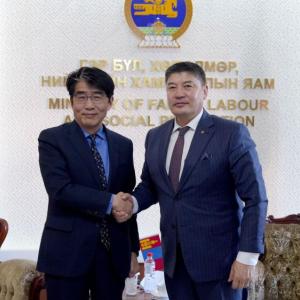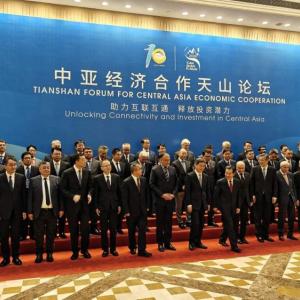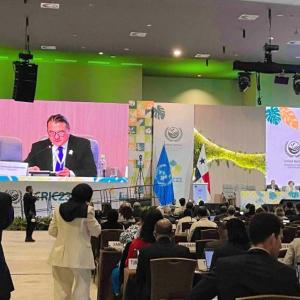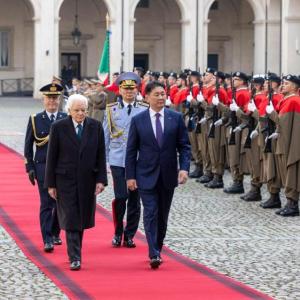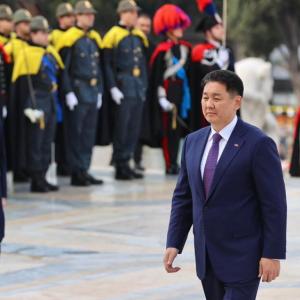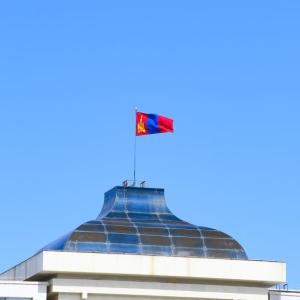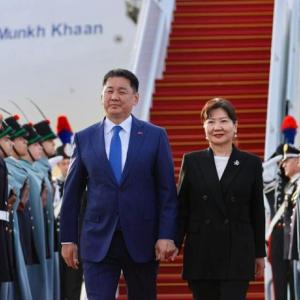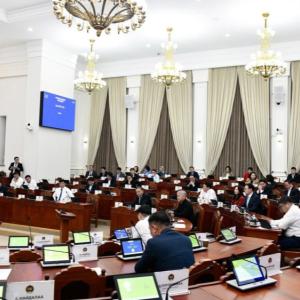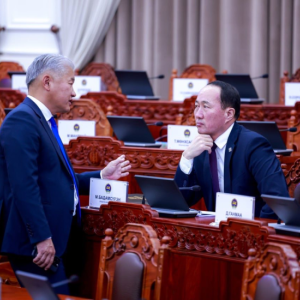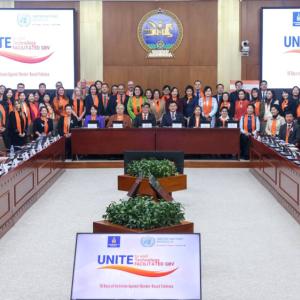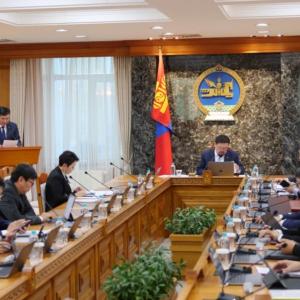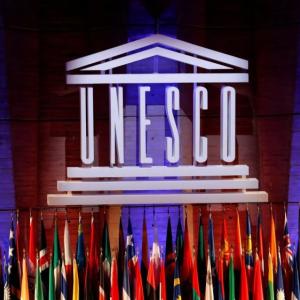MongolBank pursues medium-term strategy to renew its operations
The Mongol Messenger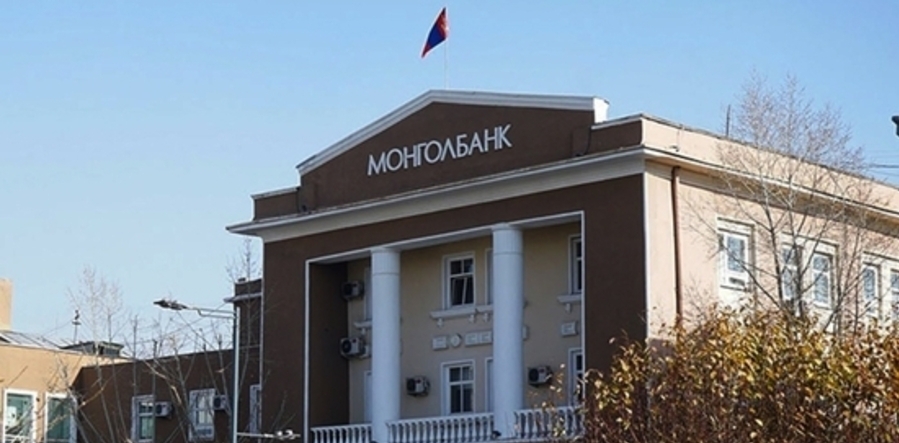
B.Lkhagvasuren, Deputy Governor of the Bank of Mongolia was interviewed on Bills related to banking that have been amended or are under parliamentary discussion.
Out of 10 bills to amend the Law on Banking, some have been approved and others are in the process of getting approved by Parliament. Could you please elaborate on the purpose of the Bills?
Banking and financial system of Mongolia is regulated by numerous laws and policies. Some of them have been effective since the mid 1990’s, and have not been updated over the years. In other words, they are outdated as they do not reflect new products and services that have penetrated our lives. The newly appointed authority is working on a medium term strategy in order to renew the bank’s operations. Within this strategy, 10 laws were identified as needing an update. The first Bill legislated was the ‘Law on national payment system’, approved in May 2017 and became effective on January 1, 2018.
Banking and financial sector is the first to introduce scientific and technological advancements. Many technologies were launched, allowing people to make payments without cash by mostly using their phones. New laws have been created specifying a more inclusive implementation of such technologies and their effective regulations. Basically, the purpose of the regulations lies in protecting consumers’ rights. ‘Law on Central Bank’ and ‘Law on Banking’ were submitted and have been discussed. ‘Law on regulation of foreign currency’, ‘Law on Bill of exchange’, ‘Law on insurance of savings’ are to be discussed afterwards.
What time frame is required for changing the base laws? There is suspicion that the proposals are results of pressure from the International Monetary Fund.
Such suspicion may be due to the fact that changes are underway at the same time as the three-year Extended Fund Facility program. Amendments to some 10 laws are being made within the midterm strategy to update Mongolbank activities from 2017 to 2020. Naturally there are matters that need to be discussed with IMF regarding common international standards and practices as the government is implementing its program. Most importantly, the need for updates has been voiced by the public, politicians, scholars and researchers. For example, the Law on Central Bank has mostly stayed the same since 2000, disregarding some minor tweaks related to other laws. Therefore, necessary fundamental changes were made to the Law on Central Bank. First, there has always been criticism that the Governor of the Bank of Mongolia is all-powerful with the right to make decisions without anyone’s consensus. Therefore, in accordance with international standards, a shift to team decision-making is reflected in the amendment. Instead of the Governor, ‘Monetary Policy Committee’ is to be responsible for decisions. Second, Central Bank will not only be responsible for monetary policy, but also for maintenance of financial stability. In other words, they will pay attention to health, sustainability and reliability of the banking system. Internationally, monetary policy instruments are changing. Accordingly, we have included macro-adopted policy in the Bill, which is completely new. Protection of financial service consumers is another direction on which we will focus. There are government and non-government organizations like the ‘Agency for Fair Competition and Consumer Protection’ with the purpose of protecting consumers. However, there is not enough focus on the protection of financial service consumers. Financial services are distinct in that they encompass people of all ages. Children have accounts for child savings and allowances while retired people get their pension through banks. Yet the quality of services and products, and whether they are inclusive and satisfactory is uncertain. Thus, MongolBank is taking this responsibility and will create a special unit for protection of financial consumers that deals with complaints and suggestions.
Another controversial change is related to the main purpose of MongolBank. Previously, the law stated that the bank “will maintain stability of the national currency - tugrik”. We will now more concretely “maintain price stability”. Aims of maintaining price stability are keeping inflation low, preserving purchasing power, not imposing price burdens on low-income citizens and keeping poverty in check.

There is an understanding that current laws have been challenged enough by overcoming several economic crises. Are amendments being made because current regulatory capacity was deemed unsatisfactory?
No. It would be right to understand that the amendments are being made to match the laws with international standards as well as to regulate new monetary policy tools. Let me give you an example. Mongolbank does inspections of commercial banks. The previous method of inspection was retrospective, meaning it examined the results. An inspector reviewed the commercial bank’s operations and pointed out things like, “there is a growing amount of outstanding or bad loans”,” this transaction is not legal”, etc. In other words, they commented on things that had already happened.
The amendment will focus on preventative and anticipative guidelines – things like, “this is your main focus; your prospects are such and such; there are these kinds of risks considering economic and market conditions; expected results are such”. It will be based on forecasted estimations and be predictive, rather than explanatory.
What are the main advantages of shifting monetary policy decisions to a group?
Central Banks are main economic institutions with privileged rights to print money. The problem is, only one person decides how much money to print and inject into the economy. This underlines a huge risk and imposes a huge responsibility on that person. Therefore, we proposed to change this. The appointed team will collectively make a decision in line with the economic situation after careful evaluation of different perspectives.
For example, the Federal Reserve of United States has FOMC, which comprises twelve members - Governors of Federal Reserve and presidents of Reserve Banks. Together, these people discuss and reach an agreement on a monetary policy change. MongolBank will do the same.
MongolBank’s independence index is expected to reach 80 after the Bill is approved. What regulations are related to independence?
Every year, we submit our monetary policy to Parliament. We submitted the 2018 policy guidelines in November 2017. The regulations require us to do this each year. This process drew criticism from the Parliament. The members ask questions like, “What’s the difference between this year’s and last year’s guidelines? “Will you not do anything new?” But monetary policy must be stable and outcomes of the policy become apparent only after a certain amount of time which could be 6 months or even a year. Therefore, it was decided that there is no need to discuss monetary policy each year. This change follows international practices. The 2017 policy aimed to keep inflation below 8 percent; while in 2018, the aim is to maintain it at 8 percent. These may sound similar, but the statements have very different implications. Of course we should strive to keep inflation as low as possible – but it should also be enough to provide appropriate support for the current conditions. The economy today is just starting to recover from past difficulties, so stabilizing it is crucial. Following the shrink, everything expands, including demand – and consequently, inflation. Hence, our mission is to maintain it at 8 percent, not letting it slide up. Now, we have already made a medium-term commitment with stabilization as a goal so there is no need to discuss it every year.
How will the relation between Central Bank and the Government be regulated? Current law states that in order to make up for the State Budget deficit, the Central Bank can provide loans to the Government under the condition it be paid within the year. However, MongolBank had been financing many projects and programs. How is this issue reflected in the new regulation?
2016 was a very difficult year. Nationwide, we had been talking about economic difficulties while internationally, Mongolia was regarded as being on the brink of default. Furthermore, IMF, the Asian Development Bank (ADB) and World Bank (WB) concluded that MongolBank’s independence was compromised and its implemented policies were faulty. Agencies lowered Mongolia’s credit rating to minimum. Therefore, we reviewed our operations and made a resolution to limit relations between the Bank and the Cabinet within those stated in the law. In the future, the Bank will stop financing programs like “Good fence”, “Good herder” or the “Price Stabilization Program”. This will not change the fact that MongolBank serves the Cabinet. The Cabinet’s transactions will still be made through MongolBank and the spare resources deposited. The aim is to limit the interaction, not ban it completely.
A Bill to amend Law on Banking increased the Central Bank’s rights to monitor and inspect. This implies that the Bank will pay more attention on not putting savings’ accounts at risk. Does the change mean that the degree of MongolBank’s right stated in previous legislation was not enough?
Central Bank is the institution responsible for maintaining financial stability. It inspects commercial banks within this framework. Before starting operations, commercial banks get their licenses from the Central Bank. Moreover, all of its services and products, including loans, savings, stock purchases and foreign currency transactions need special authorization, meaning they are controlled by MongolBank. Commercial banks are a trust-based business. Some 90 percent of bank money belongs to people and the remaining 10 percent to the bank owners. What should be done to ensure the normal operation of a commercial bank? How do we overcome the obstacles? Is it right to ignore it during its times of difficulty? If we consider the negative consequences of a bank’s insolvency for citizens, it may be wise to follow international practices and support the bank’s stability. Let’s take Lehman Brothers case for example. When it faced difficulties, the US Fed left it to its own devices, leading to failure. This failure caused an economic and financial crisis in 2008 that not only affected the U.S, but Europe and Asia as well. It is easy to declare bankruptcy, but its consequences are huge and connected. Therefore, we have added tools to help foresee and mitigate the risks. The ultimate purpose of MongolBank’s proposal is not to protect bank owners, but the protection of bank customers and the maintenance of financial stability.
Out of 10 bills to amend the Law on Banking, some have been approved and others are in the process of getting approved by Parliament. Could you please elaborate on the purpose of the Bills?
Banking and financial system of Mongolia is regulated by numerous laws and policies. Some of them have been effective since the mid 1990’s, and have not been updated over the years. In other words, they are outdated as they do not reflect new products and services that have penetrated our lives. The newly appointed authority is working on a medium term strategy in order to renew the bank’s operations. Within this strategy, 10 laws were identified as needing an update. The first Bill legislated was the ‘Law on national payment system’, approved in May 2017 and became effective on January 1, 2018.
Banking and financial sector is the first to introduce scientific and technological advancements. Many technologies were launched, allowing people to make payments without cash by mostly using their phones. New laws have been created specifying a more inclusive implementation of such technologies and their effective regulations. Basically, the purpose of the regulations lies in protecting consumers’ rights. ‘Law on Central Bank’ and ‘Law on Banking’ were submitted and have been discussed. ‘Law on regulation of foreign currency’, ‘Law on Bill of exchange’, ‘Law on insurance of savings’ are to be discussed afterwards.
What time frame is required for changing the base laws? There is suspicion that the proposals are results of pressure from the International Monetary Fund.
Such suspicion may be due to the fact that changes are underway at the same time as the three-year Extended Fund Facility program. Amendments to some 10 laws are being made within the midterm strategy to update Mongolbank activities from 2017 to 2020. Naturally there are matters that need to be discussed with IMF regarding common international standards and practices as the government is implementing its program. Most importantly, the need for updates has been voiced by the public, politicians, scholars and researchers. For example, the Law on Central Bank has mostly stayed the same since 2000, disregarding some minor tweaks related to other laws. Therefore, necessary fundamental changes were made to the Law on Central Bank. First, there has always been criticism that the Governor of the Bank of Mongolia is all-powerful with the right to make decisions without anyone’s consensus. Therefore, in accordance with international standards, a shift to team decision-making is reflected in the amendment. Instead of the Governor, ‘Monetary Policy Committee’ is to be responsible for decisions. Second, Central Bank will not only be responsible for monetary policy, but also for maintenance of financial stability. In other words, they will pay attention to health, sustainability and reliability of the banking system. Internationally, monetary policy instruments are changing. Accordingly, we have included macro-adopted policy in the Bill, which is completely new. Protection of financial service consumers is another direction on which we will focus. There are government and non-government organizations like the ‘Agency for Fair Competition and Consumer Protection’ with the purpose of protecting consumers. However, there is not enough focus on the protection of financial service consumers. Financial services are distinct in that they encompass people of all ages. Children have accounts for child savings and allowances while retired people get their pension through banks. Yet the quality of services and products, and whether they are inclusive and satisfactory is uncertain. Thus, MongolBank is taking this responsibility and will create a special unit for protection of financial consumers that deals with complaints and suggestions.
Another controversial change is related to the main purpose of MongolBank. Previously, the law stated that the bank “will maintain stability of the national currency - tugrik”. We will now more concretely “maintain price stability”. Aims of maintaining price stability are keeping inflation low, preserving purchasing power, not imposing price burdens on low-income citizens and keeping poverty in check.

There is an understanding that current laws have been challenged enough by overcoming several economic crises. Are amendments being made because current regulatory capacity was deemed unsatisfactory?
No. It would be right to understand that the amendments are being made to match the laws with international standards as well as to regulate new monetary policy tools. Let me give you an example. Mongolbank does inspections of commercial banks. The previous method of inspection was retrospective, meaning it examined the results. An inspector reviewed the commercial bank’s operations and pointed out things like, “there is a growing amount of outstanding or bad loans”,” this transaction is not legal”, etc. In other words, they commented on things that had already happened.
The amendment will focus on preventative and anticipative guidelines – things like, “this is your main focus; your prospects are such and such; there are these kinds of risks considering economic and market conditions; expected results are such”. It will be based on forecasted estimations and be predictive, rather than explanatory.
What are the main advantages of shifting monetary policy decisions to a group?
Central Banks are main economic institutions with privileged rights to print money. The problem is, only one person decides how much money to print and inject into the economy. This underlines a huge risk and imposes a huge responsibility on that person. Therefore, we proposed to change this. The appointed team will collectively make a decision in line with the economic situation after careful evaluation of different perspectives.
For example, the Federal Reserve of United States has FOMC, which comprises twelve members - Governors of Federal Reserve and presidents of Reserve Banks. Together, these people discuss and reach an agreement on a monetary policy change. MongolBank will do the same.
MongolBank’s independence index is expected to reach 80 after the Bill is approved. What regulations are related to independence?
Every year, we submit our monetary policy to Parliament. We submitted the 2018 policy guidelines in November 2017. The regulations require us to do this each year. This process drew criticism from the Parliament. The members ask questions like, “What’s the difference between this year’s and last year’s guidelines? “Will you not do anything new?” But monetary policy must be stable and outcomes of the policy become apparent only after a certain amount of time which could be 6 months or even a year. Therefore, it was decided that there is no need to discuss monetary policy each year. This change follows international practices. The 2017 policy aimed to keep inflation below 8 percent; while in 2018, the aim is to maintain it at 8 percent. These may sound similar, but the statements have very different implications. Of course we should strive to keep inflation as low as possible – but it should also be enough to provide appropriate support for the current conditions. The economy today is just starting to recover from past difficulties, so stabilizing it is crucial. Following the shrink, everything expands, including demand – and consequently, inflation. Hence, our mission is to maintain it at 8 percent, not letting it slide up. Now, we have already made a medium-term commitment with stabilization as a goal so there is no need to discuss it every year.
How will the relation between Central Bank and the Government be regulated? Current law states that in order to make up for the State Budget deficit, the Central Bank can provide loans to the Government under the condition it be paid within the year. However, MongolBank had been financing many projects and programs. How is this issue reflected in the new regulation?
2016 was a very difficult year. Nationwide, we had been talking about economic difficulties while internationally, Mongolia was regarded as being on the brink of default. Furthermore, IMF, the Asian Development Bank (ADB) and World Bank (WB) concluded that MongolBank’s independence was compromised and its implemented policies were faulty. Agencies lowered Mongolia’s credit rating to minimum. Therefore, we reviewed our operations and made a resolution to limit relations between the Bank and the Cabinet within those stated in the law. In the future, the Bank will stop financing programs like “Good fence”, “Good herder” or the “Price Stabilization Program”. This will not change the fact that MongolBank serves the Cabinet. The Cabinet’s transactions will still be made through MongolBank and the spare resources deposited. The aim is to limit the interaction, not ban it completely.
A Bill to amend Law on Banking increased the Central Bank’s rights to monitor and inspect. This implies that the Bank will pay more attention on not putting savings’ accounts at risk. Does the change mean that the degree of MongolBank’s right stated in previous legislation was not enough?
Central Bank is the institution responsible for maintaining financial stability. It inspects commercial banks within this framework. Before starting operations, commercial banks get their licenses from the Central Bank. Moreover, all of its services and products, including loans, savings, stock purchases and foreign currency transactions need special authorization, meaning they are controlled by MongolBank. Commercial banks are a trust-based business. Some 90 percent of bank money belongs to people and the remaining 10 percent to the bank owners. What should be done to ensure the normal operation of a commercial bank? How do we overcome the obstacles? Is it right to ignore it during its times of difficulty? If we consider the negative consequences of a bank’s insolvency for citizens, it may be wise to follow international practices and support the bank’s stability. Let’s take Lehman Brothers case for example. When it faced difficulties, the US Fed left it to its own devices, leading to failure. This failure caused an economic and financial crisis in 2008 that not only affected the U.S, but Europe and Asia as well. It is easy to declare bankruptcy, but its consequences are huge and connected. Therefore, we have added tools to help foresee and mitigate the risks. The ultimate purpose of MongolBank’s proposal is not to protect bank owners, but the protection of bank customers and the maintenance of financial stability.
The interview was published on the Mongol Messenger's third issue of 2018
O.Onon
O.Onon
 Ulaanbaatar
Ulaanbaatar






